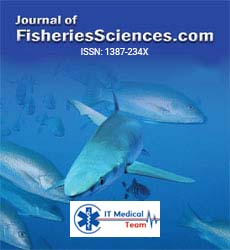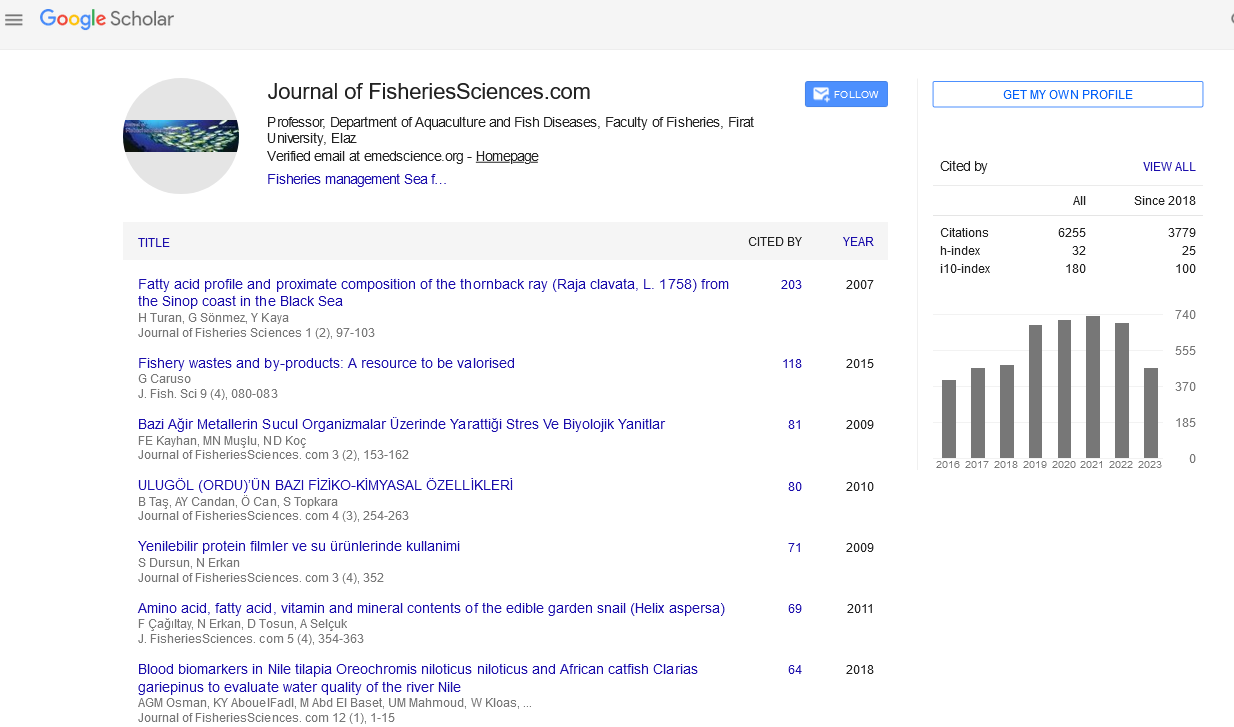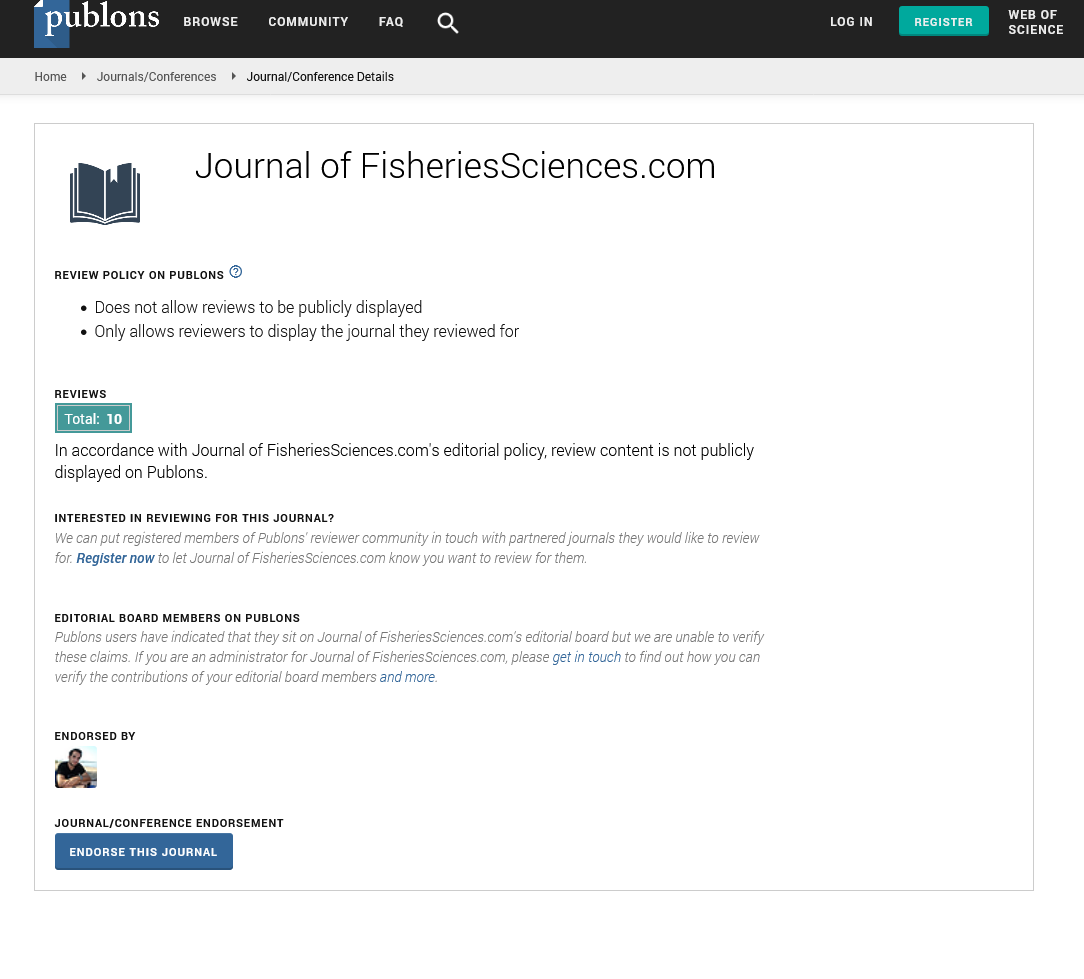Perspective - (2024) Volume 18, Issue 4
Fisheries and Ecotourism: Integrating Conservation and Economic Development
Huan Hu*
Department of Aquaculture, Saint Francis University, Italy
*Correspondence:
Huan Hu, Department of Aquaculture, Saint Francis University,
Italy,
Email:
Received: 29-Jul-2024, Manuscript No. IPFS-24-15086;
Editor assigned: 31-Jul-2024, Pre QC No. IPFS-24-15086 (PQ);
Reviewed: 14-Aug-2024, QC No. IPFS-24-15086;
Revised: 21-Aug-2024, Manuscript No. IPFS-24-15086 (R);
Published:
30-Aug-2024
Introduction
Fisheries and ecotourism are increasingly recognized as
complementary components of sustainable development,
combining conservation with economic benefits. As the global
focus on environmental stewardship grows, the synergy between
fisheries management and ecotourism offers innovative
pathways to preserve aquatic ecosystems while supporting local
economies. This article explores the intersection of fisheries and
ecotourism, examining how these sectors can collaborate to
enhance sustainability, generate income, and promote
conservation.
Description
The concept of ecotourism
Definition and principles
• Ecotourism: Ecotourism is a form of sustainable tourism that
focuses on visiting natural areas to conserve the environment,
respect local cultures, and educate travelers. It emphasizes
low-impact; responsible travel practices that aim to minimize
environmental and social impacts while maximizing
conservation benefits.
• Core principles: The principles of ecotourism include
environmental conservation, cultural respect, educational
opportunities, and economic benefits for local communities.
These principles guide the development and management of
ecotourism activities to ensure they align with sustainability
goals.
Growth and popularity
• Rising demand: Ecotourism has seen significant growth as
travelers seek authentic and nature-focused experiences. The
demand for ecotourism is driven by increasing awareness of
environmental issues and a desire to engage in responsible
travel practices.
• Diverse offerings: Ecotourism encompasses a range of activities,
including wildlife viewing, nature walks, bird watching, and
marine tours. These activities provide opportunities to experience
and appreciate natural environments while supporting conservation
efforts.
The role of fisheries in ecotourism
Aquatic ecosystems as tourist attractions
• Marine biodiversity: Healthy aquatic ecosystems, such as
coral reefs, mangroves, and estuaries, attract tourists due to
their rich biodiversity. Activities like snorkeling, diving, and
wildlife watching provide immersive experiences in these
ecosystems.
• Fishing heritage: In some regions, traditional fishing practices
and cultural experiences related to fisheries serve as
attractions for tourists. Activities such as fishing tours, visits
to local fish markets, and demonstrations of traditional fishing
techniques offer insights into local cultures and practices.
Conservation benefits
• Funding for conservation: Ecotourism can provide essential
funding for conservation initiatives. Revenue generated from
ecotourism activities can be reinvested into protecting
aquatic habitats, monitoring fish populations, and supporting
sustainable fisheries practices.
• Awareness and education: Ecotourism activities offer
educational opportunities for visitors to learn about the
importance of aquatic ecosystems and the impacts of human
activities on these environments. Increased awareness can
foster greater support for conservation efforts.
Synergies between fisheries and ecotourism
Sustainable management practices
• Integrated approaches: Combining fisheries management
with ecotourism can lead to integrated approaches that
benefit both sectors. For example, sustainable fishing
practices can enhance the health of aquatic ecosystems,
making them more attractive for ecotourism activities.
• Resource protection: Effective fisheries management
can contribute to the preservation of critical habitats and
species that are also important for ecotourism. Protecting
fish stocks and their habitats ensures that these resources
remain viable for tourism and conservation.
Economic development
• Local economic opportunities: Both fisheries and ecotourism
create economic opportunities for local communities. By
integrating these sectors, communities can diversify their income sources, reduce reliance on overexploited fisheries,
and create jobs in ecotourism-related industries.
• Enhanced livelihoods: Ecotourism can provide additional
income streams for fishers and their families. Opportunities
such as guiding tours, operating eco-lodges, or selling locally
produced crafts can complement traditional fishing activities.
Challenges and considerations
Balancing conservation and tourism
• Environmental impact: While ecotourism aims to minimize
environmental impacts, poorly managed tourism activities
can still harm aquatic ecosystems. Overcrowding, pollution,
and habitat disturbance are potential risks that must be
managed to ensure sustainability.
• Carrying capacity: Determining the carrying capacity of
aquatic ecosystems for tourism is essential to avoid overuse.
Effective management practices, such as setting visitor limits
and monitoring environmental conditions, can help maintain
the balance between tourism and conservation.
Cultural sensitivity and equity
• Respecting local cultures: Ecotourism must be developed in a
way that respects local cultures and traditions. Engaging with
local communities and incorporating their perspectives into
tourism planning can help ensure that tourism benefits are
shared equitably.
• Inclusivity: Ensuring that the benefits of ecotourism extend to
all members of the community, including marginalized
groups, is important for promoting social equity and fostering
positive relationships between tourists and local residents.
Collaborative efforts
• Stakeholder engagement: Successful integration of fisheries and
ecotourism requires collaboration among stakeholders, including
government agencies, local communities, conservation
organizations, and the private sector. Collaborative efforts can
enhance planning, management, and implementation of
sustainable practices.
• Shared goals: Aligning the goals of fisheries management and
ecotourism is crucial for achieving mutual benefits. Clear communication and coordination between sectors can help
ensure that both conservation and economic objectives are
met.
Case studies and success stories
The Great Barrier Reef, Australia
• Marine tourism: The Great Barrier Reef is a prime example of
how fisheries and ecotourism can coexist. Sustainable fishing
practices and marine tourism activities are managed to
protect the reef’s biodiversity and support local economies.
Revenue from tourism helps fund conservation efforts and
research.
The Galápagos Islands, Ecuador
• Conservation and tourism: The Galápagos Islands have
successfully integrated ecotourism with fisheries management.
Strict regulations on fishing and tourism activities help protect
unique marine species and habitats. Ecotourism provides
significant economic benefits and supports conservation
programs.
• The Maldives: Sustainable fishing and tourism: The Maldives
has developed a model where sustainable fishing practices
and ecotourism are complementary. Marine protected areas,
combined with eco-friendly tourism practices, contribute to
the health of marine ecosystems and the local economy.
Conclusion
The intersection of fisheries and ecotourism offers a promising
avenue for promoting sustainability, conserving aquatic
ecosystems, and supporting local communities. By integrating
responsible tourism practices with effective fisheries
management, it is possible to achieve a balance that benefits
both environmental conservation and economic development.
Addressing challenges, fostering collaboration, and ensuring that
both sectors work towards shared goals are key to realizing the
full potential of this synergy. As the demand for sustainable and
nature-based experiences grows, the collaboration between
fisheries and ecotourism will play an increasingly important role
in shaping the future of our aquatic environments and the
communities that depend on them.
Citation: Hu H (2024) Fisheries and Ecotourism: Integrating Conservation and Economic Development. J Fish sci Vol:18 No:4






